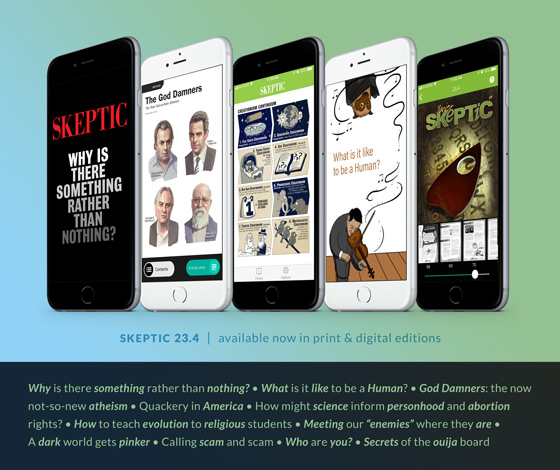PRE-ORDER THE AUTOGRAPHED PAPERBACK
Heavens on Earth
Only $15.92 autographed!
Heavens on Earth is a scientific exploration into humanity’s obsession with the afterlife and quest for immortality from the bestselling author and skeptic Michael Shermer. In his most ambitious work yet, Shermer sets out to discover what drives humans’ belief in life after death, focusing on recent scientific attempts to achieve immortality along with utopian attempts to create heaven on earth. Pulitzer Prize-winning author of Guns, Germs, and Steel, Jared Diamond, wrote:
“This book’s theme is the one of greatest practical importance to all of us: does some heaven or afterlife await us after we die? Most Americans, and even many atheists, believe that the answer is ‘yes.’ If there is no heaven, how can we find purpose in life? Michael Shermer explores these big questions with the delightful, powerful style that made his previous books so successful—but this is his best book.”

MICHAEL SHERMER’S “SKEPTIC” COLUMN IN SCIENTIFIC AMERICAN
Kids These Days: How to Avert a Looming Crisis
Something is amiss among today’s youth. This observation isn’t the perennial “kids these days” plaint by your middle-aged correspondent. According to San Diego State University psychologist Jean Twenge, as reported in her book iGen (Atria, 2017), to the question “Do you have [a] psychological disorder (depression, etc.)?” the percentage of college students born in 1995 and after (the Internet Generation, or iGen) answering affirmatively in a Higher Education Research Institute study rose between 2012 and 2016. For men, the figure increased from 2.7 to 6.1 percent (a 126 percent increase) and for women from 5.8 to 14.5 percent (a 150 percent rise). The National Survey on Drug Use and Health found that between 2011 and 2016 the percentage of boys who experienced a depressive episode the prior year increased from 4.5 to 6.4 and in girls from 13 to 19.
iGeners began entering college in 2013. Between 2011 and 2016 there was a 30 percent increase in college students who said they intentionally injured themselves (for example, by cutting), and according to the Fatal Injury Reports of the Centers for Disease Control and Prevention, suicide rates increased 46 percent between 2007 and 2015 among 15- to 19-year-olds. Why are iGeners different from Millennials, Gen Xers and Baby Boomers?
Twenge attributes the malaise primarily to the widespread use of social media and electronic devices, noting a positive correlation between the use of digital media and mental health problems. Revealingly, she also reports a negative correlation between lower rates of depression and higher rates of time spent on sports and exercise, in-person social interactions, doing homework, attending religious services, and consuming print media, such as books and magazines. Two hours a day on electronic devices seems to be the cutoff, after which mental health declines, particularly for girls who spend more time on social media […]
Follow Michael Shermer on
Twitter • Facebook • Blog • YouTube
GIVE A LITTLE BIT MORE
Give 101% via PayPal Giving Fund
Donate this holiday season and make your gift go even further. From now through December 31, PayPal Giving Fund will add 1% to all donations. 101% of your donation will be forwarded to the Skeptics Society when you donate via paypal.com/fundraiser/charity/112338.












